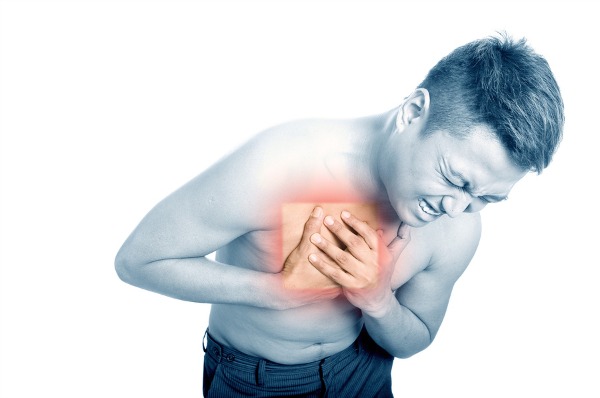
Some heart attacks start with mild chest pain that builds up slowly. Chest pain and heart attack symptoms Chest pain is only one of the possible signs of an impending heart attack.

If you notice one or more of the signs below in yourself or someone else call 911 or your local emergency number right away.
Upper chest pain. Chest pain appears in many forms ranging from a sharp stab to a dull ache. Sometimes chest pain feels crushing or burning. In certain cases the pain travels up the neck into the jaw and then radiates to the back or down one or both arms.
Many different problems can cause chest pain. The most life-threatening causes involve the heart or lungs. A sharp chest pain that worsens when you breathe or cough Chest pain may spread throughout your upper body and may also turn into a constant ache.
If you have unexplained chest pain when breathing. Sometimes muscular problems may cause pain in the chest and upper back. Repetitive use or overuse of multiple muscle groups for example through activities such as.
If you experience new or unexplained pain pressure or discomfort in the center of your chest or in your arms back jaw neck or upper stomach along with shortness of breath a cold sweat nausea fatigue or lightheadedness for at least five minutes call 911. These symptoms may signal a heart attack or myocardial infarction. It can result in sharp chest pain when breathing deeply.
Lung infections such as pneumonia can cause sharp or stabbing chest pain. Chest pain stemming from GERD may affect your upper body in some cases but its most often centered either behind your sternum or just underneath it in an area known as the epigastrium. Chest wall pain is very common in people seen by doctors for chest pain and is only rarely caused by a serious medical problem.
In the large majority of cases it is relatively easy for an attentive physician to diagnose the cause of chest wall pain and to recommend appropriate treatment. Chest pain that comes and goes might be due to a heart problem or respiratory or digestive issues. Pain in the chest that comes and goes may signal a.
Chest pain on the other hand can feel like a tight burning sensation in the upper abdomen or below the breastbone. Some people also describe it as pressure or a. Pain that resembles a strong pressure applied to the chest pain or discomfort in other areas of the upper body including neck back shoulders arms or jaw a pain in the jaw is particularly.
Pneumonia is an infection of the lungs. It can be caused by many different bacterial viral and fungal organisms. People with pneumonia often experience chest pain when breathing and coughing.
Chest pain and heart attack symptoms Chest pain is only one of the possible signs of an impending heart attack. If you notice one or more of the signs below in yourself or someone else call 911 or your local emergency number right away. Uncomfortable pressure squeezing fullness burning tightness or pain in the center of the chest.
Coronary artery disease can cause a painful sensation in the chest called angina. But usually that pain is described as heaviness achiness tightness or pressure rather than a sharp sudden blast of pain. This type of pain is usually brought on by exertion and goes away with rest Dr.
Heartburn is chest pain that occurs when stomach acid leaks out of the stomach and back up into the esophagus food pipe. The esophagus is the tube that. Pain in the upper-left quadrant of the chest while breathing may be caused due to an esophageal spasm.
This condition is not widely seen. The nerves which serve the heart and the esophagus are the same. Disorder of the esophagus makes swallowing difficult and sometimes painful.
Some heart attacks start with mild chest pain that builds up slowly. They can also start quite abruptly with intense pain on the left side or center of your chest. Other symptoms of heart attack.
The symptoms of bronchitis include a dry hacking cough fatigue and expelling yellowish whitish or greenish sputum that can be streaked with blood. Bronchitis can also cause shortness of breath fever and a feeling of tightness in the chest. This chest tightness combined with a strenuous cough can lead to chest pain.